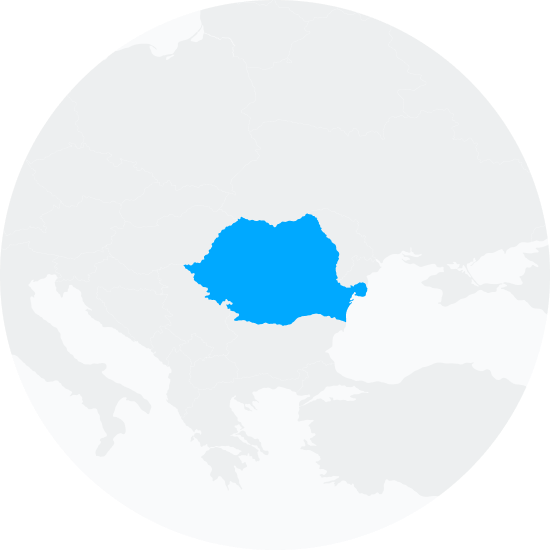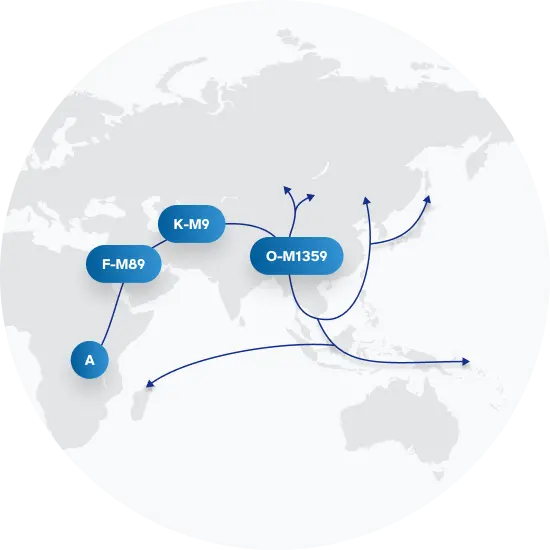Explore the Family Name Pop
How common is the last name Pop in the United States?
The surname 'Pop' has seen a significant increase in popularity in the United States between 2000 and 2010, according to data drawn from the Decennial U.S. Census. In 2000, 'Pop' was ranked as the 25,272nd most common surname, but by 2010 it had climbed to the 17,921st position, marking an impressive rise of 29.09%. The count of individuals with this last name also surged by nearly 70%, jumping from 920 in 2000 to 1,560 in 2010. Consequently, the proportion of individuals named 'Pop' per 100,000 people increased by 55.88% over the same period.
| 2000 | 2010 | Change | |
|---|---|---|---|
| Rank | #25,272 | #17,921 | 29.09% |
| Count | 920 | 1,560 | 69.57% |
| Proportion per 100k | 0.34 | 0.53 | 55.88% |
Race and Ethnicity of people with the last name Pop
When examining the ethnic identity of those with the surname 'Pop', the Decennial U.S. Census data reveals that the largest group identifies as White, comprising 84.74% of the population in 2010, a slight decrease from 86.63% in 2000. The Hispanic representation within the 'Pop' surname holders saw a substantial growth of 124.71% during the decade, rising from 5.22% to 11.73%. However, the percentages of individuals identifying as Asian/Pacific Islander and Black both decreased, with the former dropping by 20.54% and the latter by 25.10%. There were no recorded changes in the categories of 'Two or more races' and 'American Indian and Alaskan Native'.
| 2000 | 2010 | Change | |
|---|---|---|---|
| White | 86.63% | 84.74% | -2.18% |
| Hispanic | 5.22% | 11.73% | 124.71% |
| Black | 2.39% | 1.79% | -25.1% |
| Asian/Pacific Islander | 1.85% | 1.47% | -20.54% |
| Two or More Races | 3.91% | 0% | 0% |
| American Indian and Alaskan Native | 0% | 0% | 0% |
Pop ancestry composition
23andMe computes an ancestry breakdown for each customer. People may have ancestry from just one population or they may have ancestry from several populations. The most commonly-observed ancestry found in people with the surname Pop is Greek & Balkan, which comprises 65.8% of all ancestry found in people with the surname. The next two most common ancestries are Eastern European (16.3%) and British & Irish (4.0%). Additional ancestries include French & German, Italian, Spanish & Portuguese, Scandinavian, and Central Asian.
Ready to learn more about your ancestry? Get the most comprehensive ancestry breakdown on the market by taking our DNA test. Shop 23andMe
| ANCESTRY BREAKDOWN | COMPOSITION |
|---|---|
| Greek & Balkan | 65.8% |
| Eastern European | 16.3% |
| British & Irish | 4.0% |
| Other | 13.9% |

Possible origins of the surname Pop
Your DNA provides clues about where your recent ancestors may have lived. Having many distant relatives in the same location suggests that you may all share common ancestry there. Locations with many distant relatives can also be places where people have migrated recently, such as large cities. If a large number of individuals who share your surname have distant relatives in a specific area, it could indicate a connection between your surname and that location, stemming from either recent ancestral ties or migration.
Based on 23andMe data, people with last name Pop have recent ancestry locations all within Romania.
| RECENT ANCESTRY Location | Percentage |
|---|---|
| Sibiu, Romania | 84.30% |
| Mures County, Romania | 84.30% |
| Maramures County, Romania | 84.30% |
| Bihor County, Romania | 84.30% |
| Cluj County, Romania | 84.30% |
What Pop haplogroups can tell you
Haplogroups are genetic population groups that share a common ancestor on either your paternal or maternal line. These paternal and maternal haplogroups shed light on your genetic ancestry and help tell the story of your family.
The top paternal haplogroup of people with the surname Pop is O-F2415, which is predominantly found among people with East Asian & Indigenous American ancestry. Haplogroup O-F2415 is descended from haplogroup O-M1359. Other common haplogroups include E-M183 and O-F2859, which are predominantly found among people with European and East Asian & Indigenous American ancestry.
The most common maternal haplogroups of people with Pop surname are: J1, H, T. These most commonly trace back to individuals of European ancestry.
 Paternal Haplogroup Origins O-M1359
Paternal Haplogroup Origins O-M1359
Your paternal lineage may be linked to the Cham
One of the many populations harboring members of haplogroup O1b1a1a1a1 is the Cham ethnic group, a group of people who speak Austronesian languages in Mainland Southeast Asia. Austronesian languages make up a language family that is extremely large and widespread, comprising over 350 million people on islands such as Madagascar, Easter Island, and many others. However, Austronesian languages are less common on mainland Asia, with a notable exception being the Chamic language. Research suggests that ancestors of the Cham people migrated from Southeast Asian islands to the mainland around the year 500 BCE, and that early Cham populations quickly began mixing with indigenous southern Vietnamese populations. As a result, the Chamic language now has words that were borrowed from languages spoken by indigenous Vietnamese people. It is likely that an ancestral Kinh population was one of the populations that mixed with the Cham people shortly after their migration to mainland Asia.
Your maternal lineage may be linked to Marie Antoinette
Because it is so dominant in the general European population, haplogroup H also appears quite frequently in the continent's royal houses. Marie Antoinette, an Austrian Hapsburg who married into the French royal family, inherited the haplogroup from her maternal ancestors. So did Prince Philip, Duke of Edinburgh, whose recorded genealogy traces his female line to Bavaria. Scientists also discovered that famed 16th century astronomer Nicolaus Copernicus traced his maternal lineages to haplogroup H.

What do people with the surname Pop have in common?
Spoiler alert: it's complicated. People with the same last name are usually no more genetically similar than a randomly sampled group of people from the same population. That said, people with the same surname are more likely to have similar ancestries than randomly sampled individuals. The reason is the tendency of people with similar cultural or geographical backgrounds to preferentially mate with one another. That's why people who share a surname may be more likely to share traits and tendencies in common than people within the general population. Check out the percentages below to see the prevalences of tastes, habits, and traits of people with your surname compared with prevalences among 23andMe users.
Preferences
Traits

Misophonia
When sounds made by others, like the sound of chewing or yawning, provoke strong emotional reactions in an individual.
"Pop" Surname 38.1%
23andMe Users 27.9%
Habits
Are health conditions linked to the last name Pop?
The short answer is that, if there is an association between surname and health, it's usually more about your ancestry than your name. Individuals with a given surname are no more genetically similar than the general population but often have similar ancestries. The populations of people associated with those shared ancestries often have sets of genetic variations, also known as alleles, in common. Some of those alleles are associated with a greater likelihood of developing certain diseases.
Disease variant frequency by ancestry
Disease allele frequencies in populations associated with the surname Pop are shown below. Important Note: not everyone with a disease allele will develop these health condition





